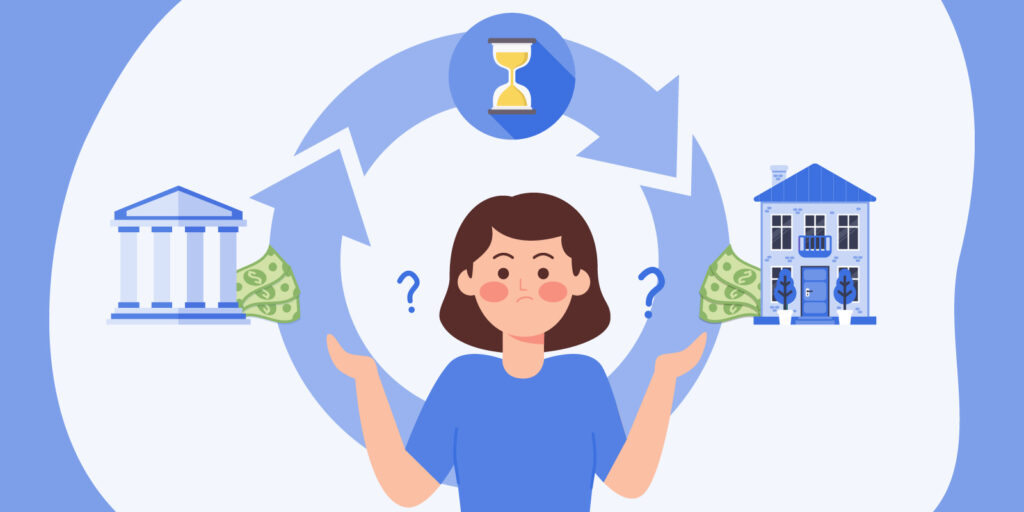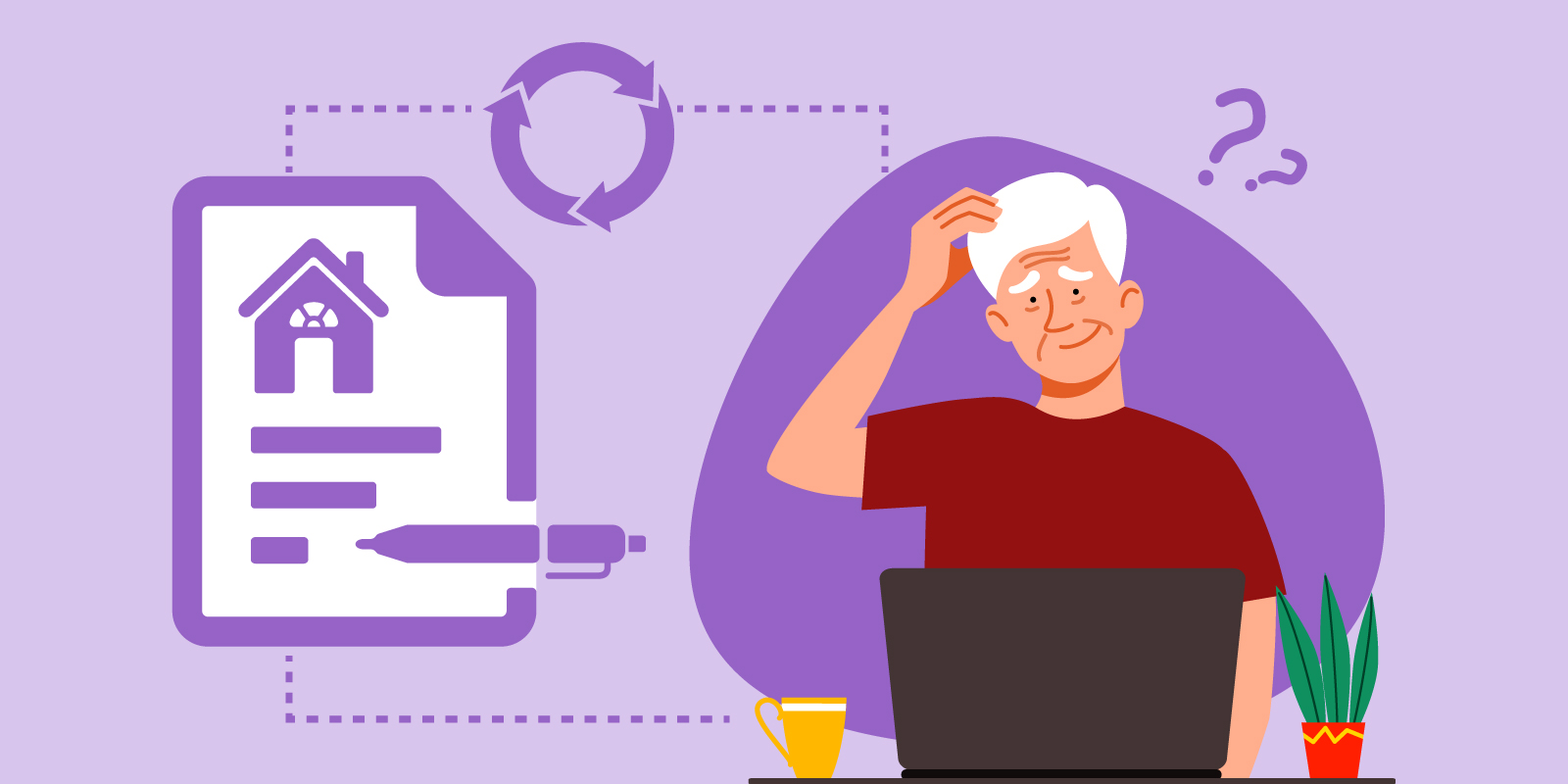Are you interested in a mortgage refinance? Whether you’re trying to reduce the interest rate on your current loan or increase your cash flow, refinancing your mortgage can be a great choice. Let’s take a closer look at the process, the pros and cons, and whether a mortgage refinance is right for you.
What Is a Mortgage Refinance?
Put simply, refinancing a mortgage involves replacing your current mortgage with one that offers better terms. Common types of mortgage refinance options include the following.
- Rate and Term Refinance: As the name suggests, this option lets you adjust your interest rate and loan terms. While the overall loan amount remains the same as your existing loan, you can end up with lower monthly mortgage payments throughout the life of the loan.
- Cash-Out Refinance: This option involves switching your current mortgage loan to a larger one. The difference is then sent back to you in the form of cash. You aren’t necessarily looking for lower monthly payments with cash-out refinancing, but this loan option is especially helpful if you are looking to tackle costly home improvements or other projects. Some people also utilize this option to pay off debt.
- Cash-In Refinance: In this refinancing plan, you contribute cash in exchange for smaller loan amounts. While the loan terms usually stay the same, the principal balance will decrease. Cash-in refinancing is very similar to mortgage recasting. However, one of the biggest differences is that with cash-in refinancing, you’ll have to pay closing costs (as opposed to a mortgage recasting fee), and you have the opportunity to utilize lucrative refinance rates if you are eligible.
- Short Refinance: When a homeowner is unable to make mortgage payments, a lender may offer a short refinance in lieu of a complete foreclosure. The benefit of a short refinance is that you can reduce your monthly payments on your existing mortgage. However, a short refinance also comes with some baggage, particularly in the form of a hit on your credit. However, missed mortgage payments and foreclosing will both hit your credit score, so if you find yourself unable to make your payments, it’s worth it to look into a short refinance.
These are just a few kinds of mortgage refinance options. The many types each cater to different needs. While some refinancing options, such as short refinances, are done out of necessity, many are chosen by homeowners. Let’s explore some benefits of choosing a mortgage refinance.
What Are the Benefits of a Mortgage Refinance?

The main reason people refinance their mortgages is to save money. Over the course of 2020 and 2021, homeowners lowered their mortgage payments by over $1.3 billion through refinancing. This resulted in approximately $14 billion in savings.
Lower Interest Rates
A major incentive for mortgage refinancing is lower interest rates, which has the potential to save thousands of dollars. For example, say you have a $250,000 loan with an interest rate of 6%. Switching to an interest rate of 3% could save about $400 a month, which comes in handy for paying off debts or increasing savings. Typically, lower interest rates are available when rates drop. You may also be eligible for reduced rates if you have a good credit score.
Different Mortgage Terms
In addition to offering lower interest rates, many rate and term mortgage refinance options let you change the mortgage term or repayment length. For instance, you could shift from a 30-year term to a 20-year term, allowing you to pay off your home loan more quickly. Because refinancing often comes with reduced interest rates, you won’t experience a large change in monthly payments. On the flip side, if you’re struggling to make your payments, you could switch to a longer loan term.
Less Debt
Are you dealing with high-interest debt? You can tap into your home equity through a cash-out refinance and receive extra funds to pay it off. This saves you from continuing to pay hefty interest fees down the line. The money from a cash-out refinance can also be invested into other needs such as medical expenses, tuition or home renovations.
Removal of Private Mortgage Insurance
When you first take out a mortgage, you may be asked to place a down payment on the home. If this amount is less than 20% of the home’s purchase price, private mortgage insurance (PMI) will become part of your plan. PMI, which costs about $30 to $70 for every $100,000 borrowed, protects lenders if you cannot pay off your mortgage.
Generally, you can stop PMI once your loan balance is 80% of the original home value. You can also stop these payments through a mortgage refinance. To qualify, your new mortgage balance must be 80% less than the home value. This usually occurs when your home value has increased.
A Switch to Fixed Interest Rates
When taking out a loan, you may have a choice between a fixed interest rate (which remains the same throughout the loan term) and an adjustable interest rate (which can change based on market conditions). If you have an adjustable rate, and you’re worried about interest increasing, you can refinance to a plan with fixed interest.
When Should (and Shouldn’t) I Refinance My Mortgage?
Now that you know the benefits of a mortgage refinance, you’re probably wondering—is it right for me? According to financial experts, refinancing is a good idea if it makes paying your bills easier. For example, if you’re struggling with debt, a cash-out refinance could help.
Refinancing is also advisable if it helps save money. To determine how much you’ll save, consider the following factors.
- Your current monthly payments and interest rate
- The balance left on your mortgage
- The remaining loan term
- The new interest rate and loan term
- Any fees (such as application and home appraisal fees)
- Any potential after-tax savings
Once you’ve gathered this information, input it into a mortgage refinance calculator to estimate your savings. Generally, refinancing is beneficial if you can lower your interest rate by at least 2%.
On the other hand, if refinancing your mortgage isn’t necessary and doesn’t offer any cost-saving benefits, you should probably avoid the process. Mortgage refinancing also isn’t recommended if you plan on moving soon, as many options deliver benefits over a long period of time. If you move quickly, you won’t enjoy the full extent of your savings.
How Do I Refinance My Mortgage?
Before you can refinance your mortgage, you’ll have to submit an application for the refinancing option you’re interested in. Lenders typically evaluate the following information.
- Income and assets
- Debt
- Credit score
You also have to receive a home appraisal to determine your home’s value. This can influence your refinancing options. For example, if your appraisal is low, you might not qualify for cash-out refinancing. On the other hand, if it’s high, you may be able to remove your PMI.
Once your application is approved, you can lock down an interest rate or opt for a floating rate (which can increase or decrease before you get the loan). The last step is closing the loan with your lender. Overall, this process takes anywhere from 45 to 60 days.
Mortgage FAQS:
Still have questions? Here are some of the most commonly asked questions regarding the refinancing process.
Do I have to pay closing costs on my refinance?
Refinancing will cancel your current mortgage loan and replace it with a new one, often with new terms or new interest rates. Therefore, your bank will treat the loan as a separate entity, and you will have to pay closing costs once again.
You may also have another origination fee, which your mortgage lender will charge to process a new loan application.
What’s the difference between an adjustable-rate mortgage and a fixed-rate mortgage?
As the name suggests, a fixed-rate mortgage features an interest rate that is fixed throughout the life of the loan. Many homeowners prefer fixed-rate mortgages as it provides consistency and predictability in their monthly mortgage payment. In adjustable-rate mortgages, homeowners often qualify for a lower than average interest rate for a fixed period of time within the life of their loan (usually 7 or 10 years). After that, your interest rate will adjust to match the market. Although less predictable, some homeowners choose an ARM interest rate to save money upfront and then opt to refinance once their fixed term is up. ARM interest rates could also be beneficial if you don’t plan on staying in your home long-term.
Does refinancing change my home insurance premiums?
Although not likely, refinancing your home may impact your homeowners insurance policy if you need to increase coverage to meet your new loan conditions. However, the much more likely scenario in which refinancing would impact your home insurance is if you have a credit-based policy. Refinancing your home will put a new ding on your credit score, and if you were teetering between a credit mile marker, it might be just the fatal blow that gets you back down into a lower tier. If your insurance company utilizes credit to determine your premium, you will experience a ding there as well. Luckily, there are ways to compensate for this change. First, talk to your insurance agent before you begin the refinance process to see if you should be considered. If that doesn’t work, you can always shop around for new carriers to find the best premium.
How long is the loan process for refinancing?
On average, you should expect the process to take 45-60 days to complete. However, delays in appraisals may extend your timeframe.
Should I Refinance My Mortgage?
Whether you should refinance your mortgage depends entirely on your financial situation. For many people, the cost-saving benefits are worth the process. For other people, refinancing is a necessity. No matter which mortgage refinance option you’re interested in; it’s important to consider the pros and cons. Careful planning on your part helps you make the best decision for your financial interests.
Related: How Long Does A Cash-Out Refinance Take? [3 Crucial Timeline Factors]







